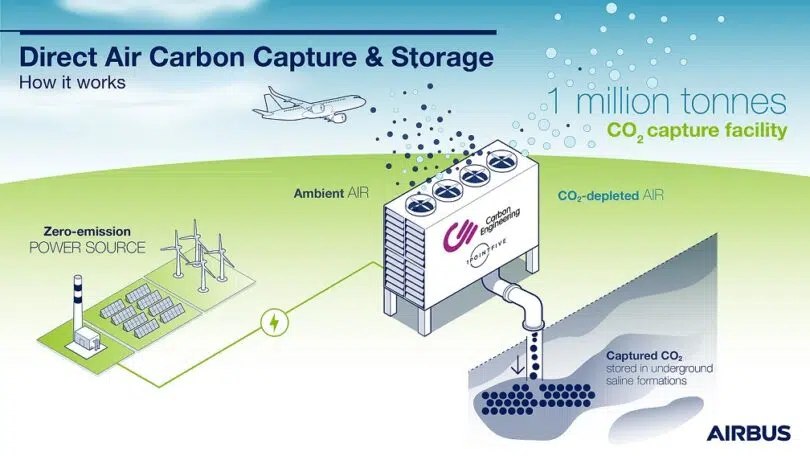Airbus and a number of major airlines have signed Letters of Intent (LoI) to explore opportunities for a future supply of carbon removal credits from direct air carbon capture technology. The major airlines include Air Canada, Air France-KLM, easyJet, International Airlines Group, LATAM Airlines Group, Lufthansa Group and Virgin Atlantic.
Direct Air Carbon Capture and Storage (DACCS) is a high-potential technology that involves filtering and removing CO2 emissions directly from the air using high powered fans. Once removed from the air, the CO2 is safely and permanently stored in geologic reservoirs.
As the aviation industry cannot capture CO2 emissions released into the atmosphere at source, a direct air carbon capture and storage solution would allow the sector to extract the equivalent amount of emissions from its operations directly from atmospheric air.
Carbon removals via direct air capture technology complement other solutions that deliver CO2 reductions, such as Sustainable Aviation Fuel (SAF), by addressing remaining emissions that cannot be directly eliminated.
As part of the agreements, the airlines have committed to engage in negotiations on the possible pre-purchase of verified and durable carbon removal credits starting in 2025 through to 2028. The carbon removal credits will be issued by Airbus’ partner 1PointFive – a subsidiary of Occidental’s Low Carbon Ventures business and the global deployment partner of direct air capture company Carbon Engineering. Airbus’ partnership with 1PointFive includes the pre-purchase of 400,000 tonnes of carbon removal credits to be delivered over four years.
“We are already seeing strong interest from airlines to explore affordable and scalable carbon removals,” said Julie Kitcher, Executive Vice President Communications and Corporate Affairs, Airbus. “These first letters of intent mark a concrete step towards the use of this promising technology for both Airbus’ own decarbonisation plan and the aviation sector’s ambition to achieve net-zero carbon emissions by 2050.”
According to the Intergovernmental Panel on Climate Change (IPCC), carbon removal is required to help the world go beyond climate mitigation and to support the achievement of net-zero targets.
In addition, according to the Air Transport Action Group’s (ATAG) Waypoint 2050 report, offsets (mainly in the form of carbon removals) will be needed – between 6 per cent and 8 per cent – to make up any remaining shortfalls in emissions above the goal.
Airbus in global tie-up with major airlines for carbon removal solutions


